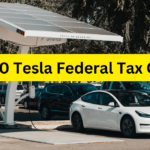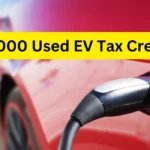In 2024, more eco-friendly cars are becoming popular. But in the U.S., the types of electric cars that get a discount from the government are changing. Before, there were lots of choices, like the Nissan Leaf and some Tesla Model 3s, but now there are fewer options. This happened because of new rules about where the batteries for these cars come from.
So, instead of 43 electric cars being eligible for the discount, now only 13 can get it. This has people talking about how this might affect the future of electric cars and if it will encourage more car companies to make them in the U.S.
Electric Vehicles qualify for tax credit 2024

Here’s a detailed breakdown of the EVs that have made the cut, offering buyers a chance to avail of a U.S. tax credit of up to $7,500 at the point of sale:
- Chevrolet Bolt EUV & Bolt EV: Chevrolet’s offerings provide both variety and affordability, with a $7,500 credit available for each, and an MSRP limit of $55,000.
- Chrysler Pacifica PHEV: This plug-in hybrid minivan offers versatility and eco-friendliness, qualifying for a $7,500 credit with an $80,000 MSRP limit.
- Ford Escape PHEV & F-150 Lightning: Ford’s commitment to electrification is evident in its offerings, with both plug-in hybrid and all-electric options eligible for tax credits ranging from $3,750 to $7,500, with an MSRP limit of $80,000.
- Jeep Grand Cherokee 4xe & Wrangler 4xe: Jeep’s plug-in hybrid SUVs blend capability with sustainability, offering a $3,750 credit and an MSRP limit of $80,000.
- Lincoln Corsair Grand Touring: This plug-in hybrid luxury SUV qualifies for a $3,750 credit with an $80,000 MSRP limit.
- Rivian R1S & R1T: Rivian’s all-electric offerings represent the future of adventure, with both models eligible for a $3,750 credit and an MSRP limit of $80,000.
- Tesla Model 3 Performance, Model X Long Range, & Model Y: Tesla’s lineup continues to lead the EV market, with multiple models qualifying for the full $7,500 credit and an $80,000 MSRP limit. (Note: Variants specified for certain models)
The process of claiming the discount has been streamlined for consumers, eliminating the hassle of post-purchase paperwork. Instead, buyers now enjoy automatic application of the tax credit at participating dealerships during the buying process. This simplification aims to encourage more consumers to consider EVs by reducing the financial barrier to entry.
A Push for U.S. EV Manufacturing
Beyond consumer incentives, several automakers are intensifying their investments in American battery plants, bolstering the domestic supply chain for EV production. Notably, Toyota’s substantial investment in its North Carolina battery plant and Ford’s ambitious plans for a mega-campus in Tennessee underscore the industry’s commitment to scaling up domestic manufacturing capacity.
Eligibility Criteria
The eligibility criteria for the EV tax credit have become more stringent in 2024, reflecting a broader policy shift towards incentivizing domestic EV manufacturing and supporting those who need the credits most. These rules encompass various factors, including MSRP caps, sourcing of critical minerals and battery components, income thresholds, and assembly locations, all aimed at fostering a sustainable and equitable transition to electric mobility.
While the current list of qualifying EVs may appear concise, experts anticipate its expansion as automakers adapt to the evolving regulatory landscape and technological advancements. In the meantime, buyers keen on embracing EVs need not wait, as the economic incentives and environmental benefits are already compelling.
Claiming the Tax Credit
For prospective buyers eyeing the 2024 EV tax credit, it’s essential to verify dealership participation, understand income eligibility, and explore potential state-level rebates.
By staying informed about the eligibility criteria and the evolving roster of qualifying vehicles, buyers can make informed decisions that align with their financial, environmental, and lifestyle priorities.
As the EV market continues to evolve, navigating the landscape of tax credits and incentives remains pivotal for individuals and families seeking to make the switch to electric, contributing to a cleaner, greener future for all.
FAQs
Why has the list of eligible EVs for tax credits decreased in 2024?
The reduction in eligible EV models is primarily due to new regulations concerning battery sourcing. Stricter criteria, including requirements for domestic manufacturing of battery materials, have resulted in fewer models meeting the qualification standards.
Are there any EVs still eligible for the full $7,500 tax credit?
Yes, several models, including certain variants of the Chevrolet Bolt, Ford F-150 Lightning, Tesla Model 3, Model X, and Model Y, qualify for the full tax credit of $7,500.
What if the EV I want to purchase qualifies for only a partial tax credit?
If an EV meets some but not all of the qualification criteria, it may be eligible for a partial tax credit of $3,750. This discount counts for specific Rivian cars and some plug-in hybrids made by Jeep, Ford, and Lincoln.
How can I claim the EV tax credit when purchasing a vehicle?
Now, when you buy a car from certain dealerships, they can give you a discount on taxes right when you buy it. This makes buying a car easier for you. However, it’s essential to confirm dealership participation and understand any additional requirements or paperwork.
Are there income limits for claiming the EV tax credit?
Yes, the tax credit is available only to individuals below certain income thresholds. For married couples, the limit is $300,000 per year; for heads of households, it’s $225,000; and for all others, it’s $150,000 in annual income.
Can I combine the federal tax credit with state-level EV rebates?
In many cases, yes. State-level EV rebates may be available in addition to the federal tax credit, providing further financial incentives for EV purchases. You should look into your state’s energy department to find out about any discounts or rewards you can get.
What's the long-term outlook for the EV tax credit and eligibility criteria?
Experts anticipate the list of eligible EVs to grow over time as automakers adapt to evolving regulations and invest in domestic manufacturing capabilities. The criteria for eligibility may also evolve to align with broader policy goals aimed at promoting sustainable transportation and economic development.
I am the mind behind nammatech.com. I have an experience of more than 8 years in the digital marketing field. The idea behind starting this blog came when one of my friends find it difficult to fill out the application form. So, I came up with an idea to start a blog on this niche.

![Low-Income Housing for Disabled Adults, Seniors Near me [2024] housing for disabled adults](https://nammatech.com/wp-content/uploads/2023/03/Low-income-housing-for-disabled-with-no-waiting-list-near-me-USA1-150x150.webp)
![Low-Income Housing for Seniors near me in USA [2024] Low-income-housing-for-seniors](https://nammatech.com/wp-content/uploads/2023/03/Low-income-housing-for-seniors-150x150.webp)
![Low-income housing with no waiting list near me in [2024] Low-income housing with no waiting list near me](https://nammatech.com/wp-content/uploads/2023/03/Low-income-housing-with-no-waiting-list-near-me-150x150.webp)




